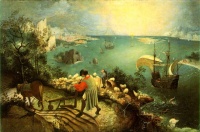Peasant
From The Art and Popular Culture Encyclopedia
| Revision as of 13:02, 15 January 2012 Jahsonic (Talk | contribs) ← Previous diff |
Revision as of 18:57, 10 September 2013 Jahsonic (Talk | contribs) Next diff → |
||
| Line 1: | Line 1: | ||
| + | [[Image:Landscape with the Fall of Icarus long thought to be by Pieter Bruegel.jpg|thumb|right|200px|''[[Landscape with the Fall of Icarus]]'' ([[1560s]]); formerly attributed to [[Pieter Bruegel the Elder]]]] | ||
| {{Template}} | {{Template}} | ||
| A '''peasant''', derived from [[15th century]] French ''païsant'' meaning one from the ''pays,'' the [[rural|countryside]] or region, which itself derives from the Latin ''pagus'', country district, is an [[agriculture|agricultural]] worker with roots in the countryside in which he or she dwells, either working for others or, more specifically, owning or [[renting]] and working by his or her own labour a small plot of ground. They are also referred to in England as a "[[cottager]]". The term peasant today is sometimes used in a pejorative sense for impoverished farmers. | A '''peasant''', derived from [[15th century]] French ''païsant'' meaning one from the ''pays,'' the [[rural|countryside]] or region, which itself derives from the Latin ''pagus'', country district, is an [[agriculture|agricultural]] worker with roots in the countryside in which he or she dwells, either working for others or, more specifically, owning or [[renting]] and working by his or her own labour a small plot of ground. They are also referred to in England as a "[[cottager]]". The term peasant today is sometimes used in a pejorative sense for impoverished farmers. | ||
Revision as of 18:57, 10 September 2013
|
Related e |
|
Featured: |
A peasant, derived from 15th century French païsant meaning one from the pays, the countryside or region, which itself derives from the Latin pagus, country district, is an agricultural worker with roots in the countryside in which he or she dwells, either working for others or, more specifically, owning or renting and working by his or her own labour a small plot of ground. They are also referred to in England as a "cottager". The term peasant today is sometimes used in a pejorative sense for impoverished farmers.
Peasants typically make up the majority of the agricultural labour force in a Pre-industrial society, depending on the cultivation of their land: without stockpiles of provisions they thrive or starve according to the most recent harvest (illustration, above right). Pre-industrial societies have diminished with the advent of globalization and as such there are considerably less peasants to be found in rural areas throughout the world. However, there are still peasant populations in Mexico, Central America, South America, Africa, India, China, Europe and various parts of Southeast Asia.
Popular revolts in late medieval Europe
See also
- Agrarianism
- Family economy
- Feudalism
- Folk culture
- Peasant economics
- Peasant Party (political movements in various countries)
- Peasant's revolt
- Petty nobility
- Popular revolt in late medieval Europe
- Serfdom
Other terms for "peasant"
- Aloer
- Campesino
- Churl
- Cotter
- Fellah
- Free tenant
- Hari
- Honbyakushō
- Kotsias
- Kulak
- Muzhik
- Nóngmín
- Pagesos de remença
- Peasant farmer
- Peon
- Serf
- Smerd
- Ṭǎran
- Tenant farmer
- Vecin
- Villein


